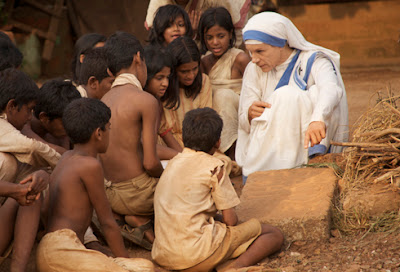We recently watched
“The Letters,” a movie (via
Netflix) about Mother Teresa. It was based on some 50-years of correspondence
she had with her assigned spiritual advisor, Father Celeste van Exem. It turned
out that Mother Teresa’s faith was actually rooted in what she knew was a “darkness”
in her soul, the darkness being the feeling that God had abandoned her combined
with doubts about her faith.
And you think, “Mother
Teresa? Really? She had doubts? She felt abandoned?”
Yes, she did
indeed. And those feelings and doubts were intimately wrapped up in her faith.
Perhaps it was a
coincidence that we were watching this movie a few hours before the mass murders
occurred at the gay club in Orlando. Perhaps not. We watched a story about a woman
who lived her faith, embracing the dying and untouchables on the streets of
Calcutta’s slums, and then the next morning heard about a gunman who walked
into a club and started firing, killing 50 people and wounding scores more.
The contrast
couldn’t be greater. What Mother Teresa’s faith told her was that every life
has value – and in the eyes of God, every life has the same value. Education, wealth, political power – none of these
matter when it comes to the value of each human life. A child with Down’s
Syndrome is just as valuable as a corporate CEO.
It was
discouraging to see how quickly Orlando became an opportunity to score
political points: Trump on immigration, President Obama and Hillary Clinton on
gun control (joined by Senator Dick Durbin of Illinois). Fifty people had been
murdered, and all our national politicians cared about was scoring election points.
 |
| Juliet Stevenson as Mother Teresa in a scene from "The Letters" |
Those 50 people
mattered. They had value. Their lives meant something. We should grieve before
we start trying to score political points.
The taking of
their lives diminishes all of us.
I have Facebook
friends who post regularly on the need for evangelical Christians to stop being
what they call “one-issue voters” (abortion) and considered the broader context
of social concerns (human trafficking, race, poverty, and other social justice
issues). I read these posts, and I wonder if I’m seeing a thinly disguised pitch
to convince me to vote for the party that openly and regularly endorses
abortion, something I’ve never been able to do in more than 40 years of voting.
I know no other
way to say it. Abortion is the denial of the value of human life, and my
understanding of that value is tied up in my faith. Asking me to disregard it or
to not consider it in how I vote is asking me to disregard my faith. “So every abortion is the denial of receiving Jesus, is
the neglect of receiving Jesus,” said Mother Teresa. “It is really a war
against the child, a direct killing of the innocent child…” She said that at
the National Prayer Breakfast in Washington, D.C., on Feb. 3, 1994, with the
First Lady in attendance.
I’m
not a one-issue voter; I can’t be, because the actual record of both major
political parties is abysmal (policy is what you do, not what you say or only
include in your platform). But I do see abortion as the social justice issue, one that wraps human trafficking (it’s
become big business, after all), poverty, and race together in one horrible
practice. And it’s based on the lie that
some human lives are more valuable than others.
Mother
Teresa saw Jesus in the dying, the diseased, the cast off, the poor. She would
also have seen Jesus bleeding and dying on the floor of an Orlando gay club.
And she would have seen Jesus on the operating table of an abortion clinic.
Top photograph by Xoan
Seoane via Public
Domain Pictures. Used with permission.

No comments:
Post a Comment